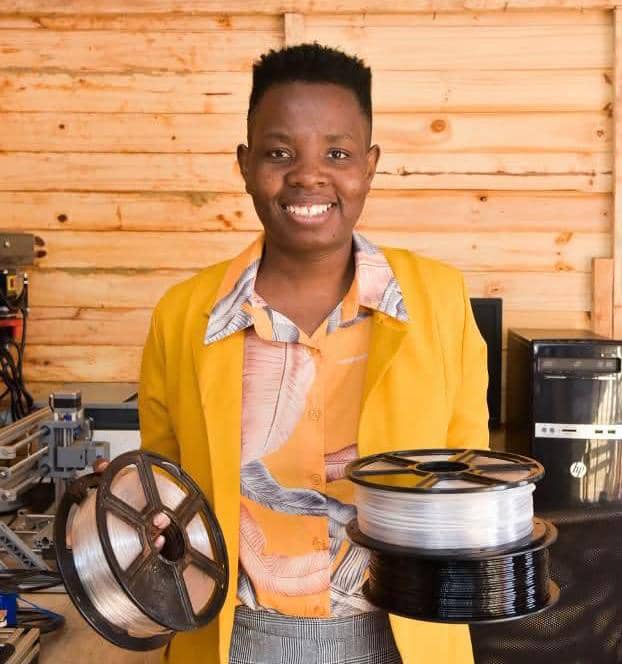For millions of amputees across Africa, the long road to mobility is often marked by frustration, from prosthetics are expensive, imported, slow to access, poorly customized, to painfully disconnected from the lived realities of users.
In South Africa alone, many in public healthcare wait months, sometimes years, for devices that rarely fit well, limit movement, or fail to restore full dignity.
These barriers don’t just hinder mobility; they fracture independence, confidence, and identity. They force people into prolonged immobility, psychological strain, and social stigma.
And even when prosthetic devices finally arrive, they often come with the additional burden of being too costly, too generic, or too uncomfortable to truly empower the user.
In this edition of Techparley’s Drive100, we spotlight a startup rewriting this painful narrative, Ukuhamba, a South African company proving that mobility, dignity, and innovation can coexist in an affordable, sustainable, proudly African solution.
Founded by Sibongile Mongadi, built on innovation with purpose, Ukuhamba is not just another prosthetics company, it is an African movement, a bold attempt to restore mobility at a fraction of the cost by designing and manufacturing locally produced, customized, and sustainable prosthetic and orthotic devices using 3D printing and recycled materials.
“Our goal,” the startup explains, “is to solve the critical problem of limited access to affordable, high-quality prosthetic limbs,” a problem fueled by expensive imports and long public healthcare delays.
With ISO 13485:2016-certified quality, innovative design, and a fusion of engineering, medicine, and fashion, Ukuhamba is proving that life-changing prosthetics don’t need to be imported, they can be built at home, by Africans, and for Africans.
What You Should Know About Ukuhamba
Ukuhamba was born from a sharp observation, Africa’s prosthetic landscape was broken, unaffordable, and disconnected from the real needs of amputees. Imported components dominated the market, driving up costs and leaving public hospitals with year-long waiting lists.
Worse, these devices often lacked customization, meaning users were left with prosthetics that hurt, didn’t move naturally, or didn’t fit their bodies or lifestyles.
Ukuhamba cuts through this systemic paralysis by locally designing and manufacturing 3D-printed prosthetics made with eco-friendly, recycled materials, reducing cost drastically and ensuring a perfect, personalized fit.
The startup’s approach blends medical precision with artistic design, allowing users to express themselves through prosthetics that are both functional and stylish.
As the founders highlight, their devices “restore mobility, independence, and dignity,” while helping amputees “challenge the stigma that often surrounds disability.”
The Problem Ukuhamba is Solving, and Why It Matters
At the heart of Ukuhamba’s mission are the deeply entrenched pain points affecting amputees, these pain points include:
Cost Barriers
Most prosthetic parts are imported. For many South Africans and other Africans across the continent relying on public health services, this makes prosthetics nearly impossible to afford.
Long Waiting Times
Hospitals often take months, even years, before a patient receives a device. For someone who has lost a limb, such a delay can halt life completely.
Poor Customization
Generic prosthetics offer minimal comfort and often lead to further physical strain or limited usability.
Stigma and Psychological Impact
Amputees frequently face discrimination, internalized shame, and societal misunderstanding.
Lack of Local Production Capacity
Africa’s dependence on imported medical devices leads to higher costs and reduced accessibility.
Ukuhamba attacks each of these barriers simultaneously, proving that a prosthetic device can be affordable, high-quality, beautiful, and medically safe, without being shipped from overseas.
How Ukuhamba’s Solution Works: A New Model for Accessible Prosthetics
Ukuhamba’s innovation begins with 3D printing, allowing the team to rapidly produce prosthetic devices tailored to the exact anatomy and mobility needs of each user.
This eliminates months-long production cycles and dramatically reduces costs. Their approach uses locally sourced, sustainable materials including recycled plastics, bringing affordability and environmental responsibility into a traditionally expensive field.
Key features of their prosthetics include:
- Custom-fitted designs for comfort and mobility
- ISO-compliant quality standards ensuring global-grade safety
- Aesthetic, wearable designs that reflect a user’s personality
- Faster production times due to in-house 3D manufacturing
The result are devices that empower users “to move freely and confidently,” while also transforming how disability is perceived across communities.
“Ukuhamba integrates design and fashion into its prosthetics, allowing users to express their individuality and take pride in their devices,” Sibongile noted.
Milestones and Traction: Building a New Industry From the Ground Up
Despite being a young company, Ukuhamba has already achieved milestones that many startups take years to reach. The team has:
- Successfully built and tested multiple 3D-printed prosthetic prototypes
- Won the Uvu Africa Online Tech Pitch Competition, among other awards
- Earned recognition among the Top 100 Inspiring Young South Africans
- Secured partnerships with research institutions and healthcare innovators
- Obtained ISO 13485:2016 certification and is progressing toward ISO 14971:2019
- Launched pilot programs with hospitals and rehabilitation centers
Each achievement reinforces a simple truth, that’s local innovation can compete with, and even outperform, imported solutions.
“Ukuhamba has gained strong traction by improving mobility and quality of life for users, positioning itself as a rising leader in Africa’s prosthetics innovation space,” the founder emphasized.
The Team Behind the Mission: A Multidisciplinary Force for Change
Ukuhamba’s team is carefully selected to bridge engineering, clinical expertise, design aesthetics, and social impact. Their multidisciplinary lineup includes:
Sibongile Mongadi — Founder and Vision Lead: A driven entrepreneur focused on innovation for social good.
Mechanical Engineer: Designs and refines prosthetic components for durability and precision.
Certified Prosthetist: Ensures medical accuracy, proper fitting, and clinical effectiveness.
Designer: Blends fashion and function, ensuring prosthetics support self-expression.
Seamstress: Creates custom covers and wearable components for comfort and flexibility.
Challenges and How Ukuhamba is Scaling Them
Operating in the Africa’s unfriendly ecosystems comes with unlimited challenges, and just like other young startups in Africa, Ukuhamba faces major obstacles, especially around:
- High manufacturing and certification costs
- Limited access to advanced materials
- Regulatory barriers
- Skepticism from traditional medical players
- Funding constraints
Yet, they are overcoming these through partnerships with universities, hospitals, and innovation hubs; adopting recycled materials; refining technology; and engaging amputee communities directly.
As they explain, “We’ve overcome challenges by leveraging partnerships… and continuously refining our technology.”
The Future: Expansion, Continental Impact, and Industry Reinvention
In the next 6–12 months, Ukuhamba plans to scale manufacturing, expand hospital partnerships, and bring its solutions to more South Africans.
Over the next 2 to 5 years, the startup ambitiously envisions:
- Becoming a leading prosthetics manufacturer in Africa
- Establishing regional hubs across the continent
- Creating new orthotic innovations tailored to African conditions
- Expanding into exports
- Providing employment opportunities for people with disabilities
Their long-term ambition isn’t just to build prosthetics, it’s to transform how Africa approaches mobility, disability, and dignity.
“We seek to redefine prosthetic care in Africa by blending technology, inclusion, and sustainability to restore mobility and dignity for all,” the team maintained.
Talking Points
Ukuhamba presents an inspiring and socially conscious mission, but it also faces structural and strategic challenges that warrant honest scrutiny.
While its focus on affordable, locally produced prosthetics is commendable, the startup operates in a highly specialized medical-device industry where long-term sustainability demands deep technical R&D capacity, rigorous clinical validation, and consistent manufacturing precision, areas where young startups often struggle without strong, scalable infrastructure.
Its reliance on 3D printing and recycled materials, though innovative, raises legitimate questions about durability, long-term performance, and large-scale standardization compared to more established global prosthetic manufacturers.
Moreover, achieving meaningful market penetration in a landscape dominated by internationally trusted brands will require more than affordability, it will demand hard scientific evidence, investor confidence, and serious investment in engineering depth.
Ukuhamba’s vision is bold and necessary, but its long-term success will depend on how well it balances its social mission with the technical, regulatory, and financial realities of building a medical-grade hardware company in a resource-constrained environment.
_____________________
Bookmark Techparley.com for the most insightful technology news from the African continent.
Follow us on X/Twitter @Techparleynews, on Facebook at Techparley Africa, on LinkedIn at Techparley Africa, or on Instagram at Techparleynews






